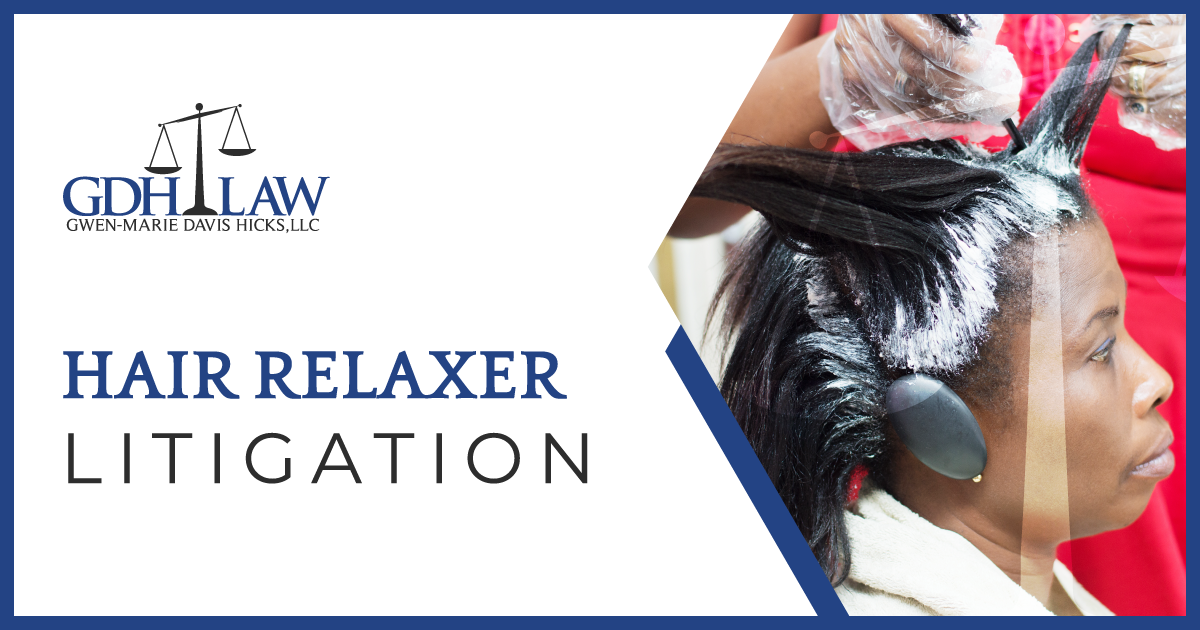Hair relaxers, cosmetic products designed to straighten curly or textured hair, have been used for decades by women in the United States. Now, we have evidence that many of these products cause cancer. The goal of Maryland hair relaxer litigation is to recover justice for people harmed by toxic hair straighteners.
If you developed uterine cancer, breast cancer, endometrial cancer, or another illness after using a hair relaxer product, we want to help you.
Our team of attorneys at GDH Law supports the rights of victims, survivors, underrepresented and marginalized individuals, and those who have been harmed by the actions of large corporations that fail to prioritize consumer safety. Contact us now to learn more about your legal rights at no cost to you.
We are currently accepting hair relaxer cancer lawsuit clients in Lanham, Prince George’s County, and throughout Maryland and Washington D.C.
Why Are People Filing Maryland Hair Relaxer Lawsuits?
In 2020, an Edgewood, Harford County resident was diagnosed with uterine cancer at 64 years of age.
She knows her cancer could have been prevented. It’s believed that she never would have been diagnosed with uterine cancer if not for the chemicals she was exposed to through hair straightening products. She is now suing L’Oréal, the cosmetics company that manufactured the hair relaxer she used from 1977 to 2019.
Sadly, her story is not an isolated one. Countless women across the country have faced similar circumstances in recent years.
People are filing Maryland hair relaxer lawsuits because they allege the only reason for their illness was exposure to toxic substances through a cosmetic hair straightening product.
Their claims are based in science.
A 2022 National Institutes of Health (NIH) study found that people who used chemical hair straighteners were at significantly higher risk of developing uterine cancer than those who did not. Researchers collected data from over 33,000 women across 11 years taking part in a women’s health study called Sister Study.
The data was compelling—study participants who had used chemical hair straightening products at least four times in the previous year were more than twice as likely to be diagnosed with uterine cancer.
If you are someone whose life was forever changed by the cancer-causing chemicals found in hair straighteners, you may be entitled to file a Maryland hair relaxer cancer lawsuit with the help of GDH Law in Lanham, MD.
Contact our team of hair relaxer cancer advocates to begin the process of obtaining justice as soon as possible. There is absolutely no cost or obligation to have your case evaluated by an attorney at our law firm.
The Connection Between Hair Relaxer Lawsuits and Racism
Most of the consumers of chemical hair relaxers in the United States are Black women.
More than half (about 60%) of the uterine cancer study subjects who used chemical hair straighteners self-identified as Black women. And of the participants of the breast cancer study—59,000 self-identified Black women between 21 and 69 years of age—only 5% reported they had never used hair relaxers.
A study on the rising rates of uterine cancer in the United States found that rates have increased disproportionately among Black women compared to other races. And, interestingly, researchers have not identified any biological factor that connects higher rates of uterine cancer with any particular racial demographic.
Instead, it is believed that an environmental factor is to blame. The use of chemical hair straighteners (and the initial use of these products beginning at an early age) is the factor that researchers have identified as causing the higher incidence rates among Black women.
Another 2021 study also found that Black women were disproportionately affected by certain subtypes of breast cancer, were diagnosed at earlier ages, and faced higher rates of breast cancer mortality than white women. The study connected the use of hair relaxers to these concerning numbers.
The reason Black women use hair straighteners in higher numbers than consumers of any other race leads us directly to the racist underpinnings that have given rise to the need for hair relaxer litigation.
Simply put, these cancer-causing products have been marketed almost exclusively to Black women—and society has continued to push Black women to use products like these.
For many young girls and adults, the choice to use chemical hair relaxers is only made due to the stigma against natural hair, especially in academic and professional settings. It is widely recognized that biased societal norms in the U.S. favor a Eurocentric standard of appearance that stigmatizes textured hair and traditional African American hairstyles. Those with curly and textured hair are often forced to change their appearance in order to be considered more professional, “clean” or “neat,” or suitable for a job or program to which they are applying.
This places heavy social pressure on individuals whose hair does not naturally conform to the artificial standard of smooth and straight—a pressure that hair relaxer companies profit from with promises to relieve. What these companies don’t admit is the dangers associated with the use of their products.
It should also be noted that researchers conducting the NIH study found no link between uterine cancer and other hair products (including bleach, hair dyes, shampoos and conditioners, or perm solutions) that are not almost-exclusively marketed to Black individuals.
In 2020, Maryland became one of several states to pass legislation against hair-based employment discrimination. Maryland’s CROWN Act (Creating a Respectful and Open World for Natural Hair Act) bans race discrimination that focuses on “traits associated with race, such as hair texture, afro hairstyles, and protective hairstyles.”
Hair Relaxer Cancer Lawsuit—2023 Updates
As of August 2023, nearly 300 lawsuits have been amassed in a class action MDL, with lawsuits being filed in numerous states across the country, including Maryland.
The basis for hair relaxer lawsuits is the fact that—despite containing potential carcinogens linked through scientific research to several women’s health issues—hair relaxer companies have not changed their formulas or packaging to address the risk. This extreme example of corporate negligence has put thousands of lives in danger. And those who have been hurt are claiming their right to seek legal action.
Here are a few important milestones in the timeline of hair relaxer cancer lawsuits in the U.S. Please contact GDH Law for updates on Maryland hair relaxer litigation.
November 2022
A group of lawyers representing plaintiffs in hair relaxer cancer cases filed a motion to consolidate cases in multidistrict litigation (MDL).
An MDL is a way to bring together a large number of cases that have a similar purpose. For example, because there are so many people who were adversely affected by hair straightener products, consolidating those cases in the same court can simplify the process. This can make it easier for people seeking justice after a cancer diagnosis to obtain a fair outcome.
February 2023
On February 6, the important announcement was made that a hair straightener class action lawsuit had been approved by the United States Judicial Panel on Multidistrict Litigation.
This decision centralized the roughly 60 hair relaxer litigation cases that had been filed in courts across the country. All cases going forward would be handled by the United States District Court for the Northern District of Illinois in Chicago under Judge Mary M. Rowland.
August 2023
On August 3, Judge Rowland issued an order to allow plaintiffs to file a Short Form Complaint (SFC) for new cases being added to the MDL.
The SFC is a way to streamline the process and make filing easier for plaintiffs.
All new hair relaxer cancer lawsuit plaintiffs can use the SFC instead of a more involved custom complaint, making the process of joining the class action MDL simpler. This means there may be a rise in the number of cases that come forward in the next several months.
We at GDH Law are prepared to guide any potential plaintiff through the process of filing an SFC to take part in the hair relaxer lawsuit.
What Kind of Cancer Does Hair Relaxer Cause?
The chemicals in hair relaxer products have been linked to uterine cancer, breast cancer, ovarian cancer, endometrial cancer, uterine fibroids, and endometriosis.
There are several toxic chemicals used prevalently in hair relaxers, including parabens, bisphenol A, metals, lye, phthalates, and formaldehyde.
It is primarily phthalates and other endocrine-disrupting chemicals (EDCs) that researchers believe are responsible for the high rates of uterine cancer, breast cancer, and other health conditions among those exposed to hair relaxer.
In particular, researchers have focused on a phthalate chemical known as Di(2-ethylhexyl)phthalate (DEHP), a synthetic chemical found in most hair relaxers. DEHP has been identified as a likely human carcinogen linked to reproductive illness. As hormone-based cancers, uterine, breast, and ovarian cancers are believed to be linked to this and other chemicals found in hair relaxers.
What Chemical Hair Relaxer Products Have Been Linked to Cancer?
There are a number of companies that may be named as defendants in Maryland hair relaxer cancer lawsuits. Some of the cosmetic companies whose products have been linked to chemical straightener cancers include:
- L’Oréal USA, Inc.
- Namaste Laboratories
- SoftSheen-Carson
- Strength of Nature Global
- Revlon
Learn More About Maryland Hair Relaxer Litigation for Free at GDH Law
Access to trusted legal guidance should always be free to those who need it.
If you believe your health condition was caused by the use of a chemical hair straightener, contact GDH Law for a free consultation.
We’ll listen to your circumstances and review the details leading up to your illness. If needed, we can partner with medical experts who can help identify the cause and impact of your cancer or other condition. Then, we’ll employ our expertise in Maryland hair relaxer litigation to help you obtain the case outcome you deserve.
Contact us now. A free and confidential case evaluation with a caring, understanding personal injury lawyer in Lanham, MD is ready for you.













